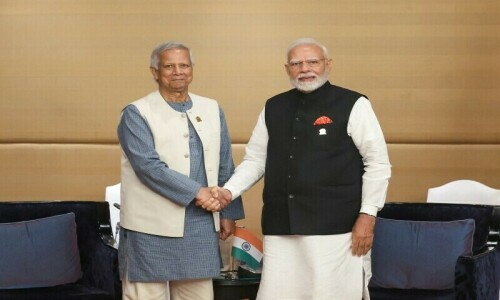NO, it is not a stick-up, nor a shake-down. The headline depicts the person on the street, surrendering to the general apathy and couldn’t-care-less attitude of the centres of power all around.
Amidst complaints of the government’s ineffectiveness, people increasingly ask when, if ever, the proverbial tipping point will come. Incidents like the breakup of Pakistan, Benazir’s assassination, the attack on Malala, ‘discovery’ of the world’s most-wanted terrorist in our backyard, and the APS attack killing scores of children, did not hasten the ‘watershed moment’ that would supposedly make us change our ways. Lest one is accused of sowing despondency or committing sedition, let it be clear that the elusive moment one so yearns for is a collective public resolve that ‘enough is enough’.
To answer why this is so, the dots can be connected in myriad ways. For the purposes of this piece, let us do it from one perspective, ie our obsession with national security in general and of late with any opportunity to claim credit for bringing the Afghan Taliban to the negotiating table. Those mystified at a former TTP spokesman’s recent ‘escape’, should brace themselves for more appeasement in the days to come.
Is it a mere coincidence that as the Afghan Taliban get closer to sharing power in Kabul, those of their ilk on this side of the Durand Line feel emboldened to reoccupy the Lal Masjid in Islamabad? The appeasement has already spawned a copycat incident in the country’s capital. Is it so difficult to see the connection between the spike in polio cases and the killing of vaccinators with impunity? Call it a skewed worldview, a warped mindset, or a delusional narrative, we are digging ourselves into a deeper hole. Khaled Ahmed has described it as “sleepwalking to surrender”, in his book with the same title.
Those ostensibly in charge feel no need for new fig leaves.
Gag the mainstream media, regulate the social media to the point of snuffing it out, suffocate the public discourse and all will appear fine. We are starved of any information about the Karachi gas leak that killed citizens but were force-fed ‘Dawn leaks’. Most worrying is the fact that those ostensibly in charge feel no need for new fig leaves to hide behind. The tried and tested ‘incompetence as opposed to complicity’ excuse does the trick every time.
Our ‘incompetence’ knows no bounds and our lack of capacity is such that the most mundane public-sector projects require the ubiquitous ‘capacity-building’ component. On top of it all, those laden with the additional responsibility of building our capacity are accused of pushing their agenda, and taking all the foreign aid back home in the shape of consultant salaries.
We are quick to mention our nuclear capability to whoever draws our attention to the risks of punching above our weight in matters of regional and global geopolitics, while having no scientific or technological base to accomplish even the simplest of tasks. Next time you go out to buy a ceiling fan, look for a label at its back giving it a three-star rating in terms of energy efficiency. It won’t hurt to know that we did not have the competence and capacity to do it ourselves. A friendly donor agency had to step forward to give us not just monetary aid but also technical advice and engineering expertise to achieve this scientific feat.
In a recent interview to The New Yorker, Yuval Noah Harari, famous author of Sapiens and 21 Lessons for the 21st Century asserted that mankind faces three big challenges, ie nuclear war, ecological collapse, and technological disruption. Everything else, including poverty, he thinks is a lesser worry.
In view of our professed incompetence, how do we propose to meet the challenge of glacial melt, nuclear accidents or adventurism, and the combined potential of big data and artificial intelligence?
Some may ask how AI is a challenge. Nations that have not invested in cognitive development and low-tech economies would not know what to do with their ‘population dividend’ when AI-driven automation makes menial manpower redundant. It is important to use these technological advancements for the collective good of the citizens and not as tools of coercion and state control.
In the same interview, Mr Harari said something that should be of grave concern here to the rulers and ruled alike. Referring in general to the Israeli occupation of Palestinian lands, he said he used to think that perpetual occupation was not possible. Now, he is afraid that with the AI boost, surveillance technology may enable indefinite occupation, without physical violence.
If Pakistan enables the Taliban to share power in Kabul as is being claimed, then whatever is good for the goose has to be so for the gander. Those sharing the Taliban worldview will have to be accommodated here as well. Similarly, allow public freedoms at home to call for the same elsewhere with moral authority.
The writer is a poet and analyst.
Published in Dawn, March 1st, 2020












































